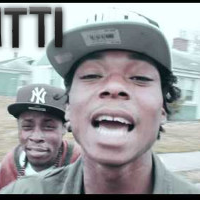Violent Rap Lyrics Increasingly Used as Evidence in Court Cases
 Twain Gotti
Twain Gotti
Lacking evidence in criminal cases, prosecutors are increasingly resorting to using violent lyrics from rap songs to demonstrate a defendant’s guilt.
In just the past two years, more than three dozen prosecutions around the country have involved the referencing or admitting of rap lyrics as evidence, according to Lorne Manly of The New York Times.
A rapper from Newport News, Virginia, is being held for the murder of two men in 2007. A police detective newly assigned to the case discovered a video of Antwain Steward, a local rapper with the stage name Twain Gotti, performing his song “Ride Out,” which describes a murder. Police charged Steward with the killings of Christopher Horton, 16, and Brian Dean, 20, primarily because of the video. There are no witnesses to the shooting and other evidence is “problematic,” according to the Times.
New Jersey’s Supreme Court will soon decide whether it was legal for prosecutors to bring up 13 pages of lyrics by defendant Vonte Skinner who was on trial for attempted homicide. The lyrics included the line: “Four slugs drillin’ your cheek to blow your face off and leave your brain caved in the street.” In Skinner’s case, however, he was identified as the shooter by the victim.
Another case is taking place in Topeka, Kansas, where a judge will rule on the admissibility of rap lyrics in a double murder trial.
District attorneys and police argue that the lyrics can amount to a confession of murder. But the strategy also can be used to sway a judge or jury into just thinking the defendant is guilty.
Some legal scholars have spoken out against the use of rap lyrics in courtrooms.
“If you aspire to be a gangsta rapper, by definition your lyrics need to be violent,” Charis E. Kubrin, an associate professor of criminology, law and society at the University of California, Irvine, told the The New York Times.
“What’s getting really unnerving,” Erik Nielson, an assistant professor of liberal arts at the University of Richmond, told the newspaper “is the amount of time it appears both police and prosecutors are spending over rap lyrics and videos on social media rather than using that time to go and gather more convincing, more conventional forms of evidence.”
Those advocating for bringing lyrics into criminal cases ignore examples like performer Rick Ross, who took his stage name from convicted drug trafficker Freeway Rick Ross. Unlike the Los Angeles-based criminal-turned-rapper, the Rick Ross of Miami based his gangster-life lyrics on his experiences as a prison guard.
There are also racist undertones to the strategy, since rap lyrics are often written by African-Americans. As a brief filed in the New Jersey case demonstrates, it’s questionable why violent rap lyrics are more relevant or admissible than those by white singers, like Johnny Cash, whose famous song “Folsom Prison Blues” includes the line: “I shot a man in Reno just to watch him die.”
-Noel Brinkerhoff
To Learn More:
Legal Debate on Using Boastful Rap Lyrics as a Smoking Gun (by Lorne Manly, New York Times)
Rap Lyrics at Heart of NJ Supreme Court Arguments (by David Porter, Associated Press)
Insane Clown Posse Sues U.S. Government for Treating Fans as Gang Members (by Noel Brinkerhoff and Danny Biederman, AllGov)
Hip Hop Protest Soldier Discharged (by Noel Brinkerhoff, AllGov)
Army Imprisons Iraq Vet for Hip Hop Song (by Noel Brinkerhoff, AllGov)
- Top Stories
- Unusual News
- Where is the Money Going?
- Controversies
- U.S. and the World
- Appointments and Resignations
- Latest News
- What If China Invaded the United States?
- Donald Trump Has a Mental Health Problem and It Has a Name
- Trump Goes on Renaming Frenzy
- Trump Deports JD Vance and His Wife
- Trump Offers to Return Alaska to Russia






Comments